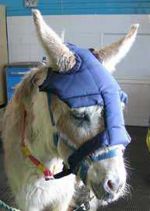Difference between revisions of "Blindness - Donkey"
(New page: {{review}} [[Image:Bumper helmet donkey.jpg|right|thumb|150px|<small><center>Blind donkey wearing 'bumper' helmet (Image courtesy of [http://drupal.thedonkeysanctuary.org.uk The Donkey Sa...) |
|||
| (5 intermediate revisions by the same user not shown) | |||
| Line 1: | Line 1: | ||
| + | {{review}} | ||
[[Image:Bumper helmet donkey.jpg|right|thumb|150px|<small><center>Blind donkey wearing 'bumper' helmet (Image courtesy of [http://drupal.thedonkeysanctuary.org.uk The Donkey Sanctuary])</center></small>]] | [[Image:Bumper helmet donkey.jpg|right|thumb|150px|<small><center>Blind donkey wearing 'bumper' helmet (Image courtesy of [http://drupal.thedonkeysanctuary.org.uk The Donkey Sanctuary])</center></small>]] | ||
| Line 8: | Line 9: | ||
'''Reduced tear film production and subsequent dry eye''' is another very common ophthalmic problem with the aged donkey. This appears to increase susceptibility to corneal ulceration and general ocular discomfort. Individuals so affected can greatly benefit from the use of any of the tear replacement preparations available on the market. | '''Reduced tear film production and subsequent dry eye''' is another very common ophthalmic problem with the aged donkey. This appears to increase susceptibility to corneal ulceration and general ocular discomfort. Individuals so affected can greatly benefit from the use of any of the tear replacement preparations available on the market. | ||
| − | |||
| − | |||
| − | |||
| − | |||
| − | |||
| − | |||
| − | |||
| − | |||
==References== | ==References== | ||
| Line 28: | Line 21: | ||
|sublink1 =Geriatric Donkey | |sublink1 =Geriatric Donkey | ||
|subtext1 =Geriatric Donkey | |subtext1 =Geriatric Donkey | ||
| − | |pagetype = Donkey | + | |rspace={{Donkey}} |
| + | |pagetype=Donkey | ||
}} | }} | ||
| − | |||
| − | |||
| − | |||
| − | |||
| − | |||
Revision as of 16:43, 18 February 2010
| This article has been peer reviewed but is awaiting expert review. If you would like to help with this, please see more information about expert reviewing. |

As with many companion animal species, donkeys can survive extraordinarily well with impaired eyesight. Obviously, those individuals that lose their sight over months cope more easily than those that suffer an acute trauma. Experience shows that the use of ‘bumper’ helmets can help avoid further trauma to the head region, especially during any period of adjustment. The helmets used at The Donkey Sanctuary are specially made by a local company, based on an adaptation of a fly mask design.
It is common to see donkeys with deteriorating eyesight start to depend increasingly on their bonded companions for support and guidance. The sighted donkey will act as a second pair of eyes for its partially sighted or blind friend.
Reduced tear film production and subsequent dry eye is another very common ophthalmic problem with the aged donkey. This appears to increase susceptibility to corneal ulceration and general ocular discomfort. Individuals so affected can greatly benefit from the use of any of the tear replacement preparations available on the market.
References
- Sprayson, T. (2008) The care of the geriatric donkey In Svendsen, E.D., Duncan, J. and Hadrill, D. (2008) The Professional Handbook of the Donkey, 4th edition, Whittet Books, Chapter 13
|
|